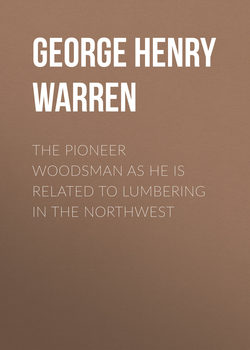Читать книгу The Pioneer Woodsman as He Is Related to Lumbering in the Northwest - George Henry Warren - Страница 5
CHAPTER III.
Entering the Wilds of Wisconsin
ОглавлениеThe party disembarked at a sand beach, but the sailboat drew too much water to permit a close landing. Here it was that the two tenderfeet got their first experience with Lake Superior's cold water, since all were obliged to climb or jump overboard into three feet of the almost icy water, and to carry on heads and shoulders portions of the luggage to the dry land. Here was to begin the first night of my camp life. Dry wood was sought, and camp fires were kindled to be used, first, to dry the wet clothing, and second, to cook the food for the first out-of-door supper.
To avoid mosquitoes, orders were given to prepare beds for the night on the sand beach away from the friendly tall trees that stood near by. One mattress served for the whole party and consisted of as level a strip of the sandy shore as could be selected. Promise of fair weather rendered unnecessary the raising of tents which were made to serve as so much thickness to keep the body from contact with the sand.
That night the stars shone brightly above the sleepers' faces, the waters of Superior broke gently along the beach, and the tall pines lent their first lullaby to willingly listening ears.
"The waves have a story to tell me,
As I lie on the lonely beach;
Chanting aloft in the pine-tops,
The wind has a lesson to teach;
But the stars sing an anthem of glory
I cannot put into speech.
They sing of the Mighty Master,
Of the loom His fingers span,
Where a star or a soul is a part of the whole,
And weft in the wondrous plan."
The next morning broke bright and clear, and the sun sent a sheen upon the dimpled waters of old Superior that gave us a touch of regret at the parting of the ways; for the members, one by one, after a well relished breakfast, shouldered their packs and fell into single file behind the Indian guide who led the way to the trail through the woods, forty miles long, to the Flambeau Reservation.
Two days and the morning of the third brought the party, footsore in new boots and eaten by mosquitoes, to the end of the trail. Now, lakes must be crossed, and the Flambeau River navigated for many days. In the Indian village were many wigwams, occupied by the usually large families of two or three generations of bucks, squaws, children, from the eldest down to the liquid-nosed papoose, and their numerous dogs that never fail to announce the approach of "kitchimokoman," the white man.
Some of the old men were building birch canoes, and many birch crafts of different ages and of previous service were to be seen in the camp. From among them, enough were bought to carry all of the men of the party and their outfits. The last canoe bought was a three-man canoe, which leaked and must be "pitched" before it could be used.
At this point let it be explained that every woodsman, trapper, pioneer, settler, or camper who depends upon a birch canoe for navigation should, and generally does, provide himself with a quantity of commercial resin and a fireproof dish in which to melt it. The resin is then tempered by adding just enough grease to prevent the mixture, when applied to the dry surface of a leaky spot on the canoe, and cooled in the water of the lake or river at the time of using, from cracking by reason of too great hardness. The surface must be dry or the "pitch" will not adhere firmly to the leaky seam or knot in the bark of the canoe. The drying is quickly done by holding a live ember or firebrand close to the surface of the wet bark.
Mr. Patrick had bought the canoes from different owners and had paid for them all except the leaky three-man canoe. It was the property of a fat squaw of uncertain age. The price agreed upon for this canoe was twenty dollars. Mr. Patrick and the squaw were standing on opposite sides of the canoe as Mr. Patrick took from his pocket a twenty dollar bill to hand her in payment. Just then he discovered that the pan of pitch (resin), which had been previously placed over the live coals, was on fire. He placed the twenty dollar bill on the canoe in front of the squaw, and quickly ran to extinguish the fire in the burning pitch. When he returned to the canoe, the bill had disappeared, and the wise old squaw claimed to know nothing of its whereabouts. A second twenty dollar bill was produced and handed to the squaw, when Mr. Patrick became the owner of a forty dollar birch canoe.
